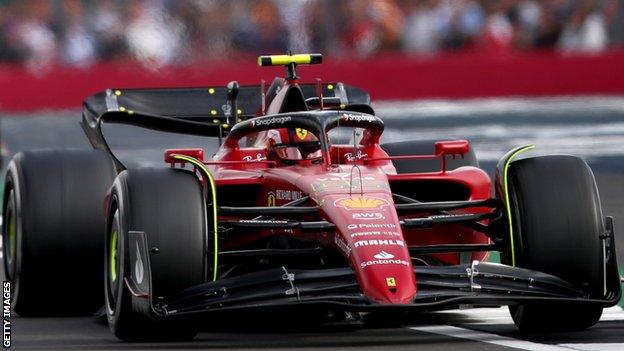British Grand Prix: Charles Leclerc insists he has not lost confidence in Ferrari
- Published
- comments

Sainz took his first career victory at Silverstone
Charles Leclerc insists he has not lost confidence in his Ferrari team after he lost victory in the British Grand Prix because of a questionable strategy call.
But when asked how concerning it was for his championship hopes that the team keeps making mistakes, he said: "It's not good. I have to say that I feel like I'm showing that every race it's not affecting me too much. But I would rather not have these problems."
Leclerc's misfortune at Silverstone was to the advantage of his team-mate Carlos Sainz, a popular, likeable, thoughtful and top-drawer driver who took a long-overdue maiden victory.
Leclerc and Sainz genuinely get on, and Ferrari's leading driver said it was "an important point" that his partner had finally broken his duck at the 150th attempt.
"As much as I am disappointed on my side," Leclerc said, "I don't think this should be a headline on what is an amazing first victory on Carlos.
"It's a dream come true. Whenever you are a child, you dream of this moment, and especially with Ferrari. He needs to enjoy, it's his day, and hopefully next time it will be my day."
It was a magnanimous response that said a lot about both the sort of man Leclerc is, and the collective team spirit at Ferrari.
But as the British Grand Prix unfolded, and Ferrari made a series of decisions that would have been unexpected - perhaps even unimaginable - if their rivals Red Bull had been in the same position, many people were asking themselves whether Ferrari had their priorities straight.
Their main rival, Red Bull's Max Verstappen, had a rare difficult race, his car disabled by damage caused after running over debris.
But Leclerc gained only six points on his rival, a figure that could and arguably should have been 19.
So instead of reducing the gap to Verstappen to 30 points - not much more than one clear victory - it is 43, or almost two.
Leclerc might not want Ferrari's decision-making to be a headline, but there is no way that it cannot be after what happened at Silverstone, where they made a series of calls that caused more than one observer to remark that it looked like they were actively trying to lose Leclerc the race and the championship.
At this point, one should rewind a little, and recall the context for the race.
On Thursday, Leclerc arrived at Silverstone saying he needed a "perfect weekend" and a run of four good results to take him and Ferrari into the summer break.
He was referring to a brutal run for him in recent events that had turned a 43-point lead over Verstappen after the first three races of the season, into a 49-point deficit after just six further grands prix.
This included two engine failures while leading in Spain and Azerbaijan; a strategy foul-up that turned a win into fourth place in Monaco; a start from the back of the grid in Canada as a result of a penalty for using too many engines already; and a spin from Leclerc at Imola that dropped him from third to sixth.
But Silverstone was not a "perfect weekend". Far from it.
Sainz took a superb maiden pole position in treacherous wet conditions in qualifying, after a spin from Leclerc at high speed at Chapel, which also happened to torpedo Verstappen's own final attempt.
In the race, though, Ferrari were gifted a golden opportunity. Verstappen had just taken the lead from Sainz, and was looking to take control of yet another race, when he ran over a piece of debris left by a collision between the two cars of the sister Alpha Tauri team. It tore a hole in his car's floor, and took him out of contention.
That left Sainz in the lead, with Leclerc right behind, clearly faster, despite a front wing missing an endplate, costing him downforce, after a first-lap battle with the second Red Bull of Sergio Perez.
The Ferraris, held back to Sainz's pace as he struggled with excessive front tyre wear through the fast corners, then began to come under pressure from Lewis Hamilton's rejuvenated Mercedes. And Leclerc began to question what was going on. "What do I need to do?" he asked. "This is messing up my race." Except he didn't say "messing".
Why did Ferrari not let Leclerc past to see if he maximise his pace, many wondered?
They began to ask Sainz to speed up. He tried, but still Hamilton closed in, and eventually they called him in for what at the time was planned to be his only pit stop.
Leclerc stayed out, but still Hamilton closed in, so Ferrari called Leclerc in five laps after Sainz, and he rejoined right behind the Spaniard. Again he was being held up.
Ferrari told Leclerc he was free to race. Then they asked Sainz to speed up to a specific lap time. And finally, when he could not do the pace requested, they ordered the drivers to swap, six laps after Leclerc's pit stop.
That should have been the race won for Leclerc. He was able to match Hamilton's lap times after the Mercedes driver's later stop, and the final laps would have been about Sainz trying to hold off Hamilton for second.
But then the safety car was deployed and Ferrari made the call that lost Leclerc the race.
They left him out on his used hard tyres, but pitted Sainz for fresh softs, a decision made by all the other leading teams with their drivers.
It left Leclerc a sitting duck - Sainz said he knew it would be "easy" to pass him at the restart. Leclerc drove superbly to fight with Perez and Hamilton on their fresh tyres for as long as he did - including a quiet brilliant overtaking move to briefly reclaim third from Hamilton around the outside of Copse corner - before finally succumbing to the inevitable.
He had so little grip by the end, that he was struggling to hold off Fernando Alonso's Alpine, a car that is more than a second a lap slower than the Ferrari in equal conditions.
Why did Ferrari do it?
Afterwards, Leclerc did what he usually does in such situations and said he would need to analyse what happened with the team.
Team boss Mattia Binotto defended Ferrari's decision-making.
"The decisions we took were the right and proper ones at each time," he said. "Should we stop Charles at the safety car, maybe is the only one we may question.
"If we would have stopped, maybe the others would have stayed out and he would have been fourth on soft tyres but other cars ahead. Would he have recovered position? I am not sure.
"It is always easy to say we could have done differently, yes. We had once again a safety car at the wrong moment when we were comfortably leading the race. That's the point."
Why did they pit Sainz and not Leclerc at the safety car?
"We thought that there was not sufficient gap to stop both of them because the second would have lost time and fallen back," Binotto said.
"Why stop Carlos? Because Charles had track position so would remain leading, because his tyres were fresher compared to Carlos', he had six or seven laps less (on them). And Carlos by stopping and being second he would protect (him) in at least the first couple of corners.
"We were hoping for more tyre degradation on the soft to give maybe Charles a difficult three or four laps and then recover later on, but the soft did not degrade as we were hoping."
As for not choosing to let Leclerc past Sainz earlier, Binotto said they always had an eye on Hamilton's position and made sure they reacted in time.
Russell on bouncing cars, Hamilton and Silverstone
What did Red Bull think?
Ferrari's decisions reflect a different way of running a team compared to Red Bull. They continue to insist that both drivers are free to race, and they prefer not to impose team orders at this stage of the season when they are disputing the lead.
Binotto has drummed into Leclerc and Sainz that Ferrari comes first - and the drivers' interests are secondary.
"I know the team is in front of and above my personal interests," Sainz said, "and I had that same philosophy when I overtook Charles, when I overtook him back.
"That's why I think we are managing well, we are getting on well, and today is a good example that we managed a good race. We had the two cars first and second, before the safety car."
Over at Red Bull, meanwhile, there are no doubts about who is their championship focus, and team boss Christian Horner more or less admitted they would not have made the same calls.
"Every team is different," he said. "I suppose the call I understood least was not to pit both cars - or certainly Charles - for the soft tyre."
The question hanging over Ferrari is whether their attempts to foster team spirit in this way have harmed their first chance to win the title since 2018.
"On a day where we had two cars that were not in good shape at different points of the race," Horner said, "Sergio has extended his lead over Charles, consolidating second (in the championship) and Max has only conceded six points. It could have been a lot worse than that."
Or as Verstappen put it, after battling to seventh in a car that had lost what Horner said was about 20% of its downforce: "Quite a lot of damage limitation today."
The battle is rejoined in Austria this weekend. Leclerc says he is "looking forward to it".
"We are strong everywhere," he said. "We just need to put everything together."
This championship was already looking a long shot for Leclerc after his recent run. Sunday was a golden opportunity for Ferrari to make amends. Will they come to regret not taking it?
